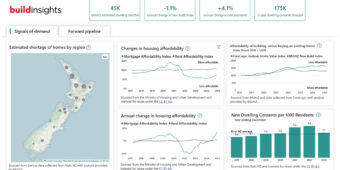BUILDING FOR CLIMATE CHANGE
26 Aug 2020, LBP & Regulation, Learn, Prove Your Know How

The building and construction sector is a significant contributor to carbon emissions. To meet New Zealand’s climate change goals, a once-in-a-generation change to building laws and requirements is under way
In July, Jenny Salesa, Minister for Building and Construction, launched the Building for Climate Change programme, with the goal of reducing emissions from constructing and operating buildings, and ensuring buildings are prepared for the future effects of climate change.
The programme recognises that a significant amount of New Zealand’s carbon emissions result from the building and construction sector, and if New Zealand is serious about meeting its climate change goals, then changes need to be made in the sector.
As part of the programme, over the next 30 years, MBIE will set targets for energy use and carbon emissions, and incentives will be introduced to encourage people to think innovatively about the construction, design and operation of buildings.
The programme will result in changes to current building laws – both the Building Act and the Building Code. There will be a focus on starting to change people’s behaviour, and the way they think about designing, constructing and operating buildings.
MBIE has outlined how the programme will be made up of three frameworks that will work together to reduce emissions:
- the operational efficiency of buildings (using less energy, using less water and improving the air quality and temperature).
- the amount of greenhouse gas emissions generated by building materials, construction processes and disposal of materials (known as whole of life embodied carbon).
- adaptation, which will link together the work that the sector can do to improve the climate resilience
of buildings.
Transforming operational efficiency
This framework will set upper limits for new buildings to obtain a consent under the Building Act 2004. The framework will set levels of efficiency for energy and water use. It will also set defined comfort levels, including temperature ranges and air quality, that will need to be achieved for consent.
These targets will mean that everyone involved in the design, development and construction of a building will need to keep efficiency at the forefront of their thinking. As well as direct benefits, there will be co-benefits, including improved health outcomes and reduced energy bills – both of these are likely to have greater impacts on parts of society that are most in need. This is an area where MBIE will seek significant cooperation and partnership with both the construction sector and other government agencies to ensure these co-benefits are delivered.
Reducing whole of life embodied carbon
This framework will set mandatory reporting requirements and targets that will need to be kept under to gain consent. The framework will consider the allowed level of greenhouse gas emissions from:
- the materials used in construction.
- the construction process.
- disposing of construction waste.
- disposal of the building at the
end of its life.
These targets are intended provide pressure on the whole supply chain to reduce emissions. They are also intended to be an important driver of change to a culture in which climate change considerations are part of day-to-day business, and to create incentives for designers and engineers to look for lower carbon solutions.
Adaptation – Making New Zealand safer for the future
New Zealand will be facing different challenges to its buildings than were faced 50 or even ten years ago. It is important to ensure that New Zealand’s buildings will last and are able to cope with the climate changes we cannot avoid. Keeping people safe from the likely future effects of climate change means MBIE will be looking at how the sector can make buildings more resilient to adverse events that might become more common and to new events that might begin to appear.
As well as improved protection, MBIE will be considering how to be more efficient in using resources that may become scarcer, such as water. Buildings will also need to remain safe, habitable and at a suitable temperature for periods of time without power in extreme weather events; for example, when utility grid connections may be broken.
MBIE will be working with other government partners on the National Adaptation Plan, a whole of government response on how New Zealand will adapt to climate change risks. The core of the response will be making sure the right buildings are built in the right places. As well as regulatory options, the work will look at what non-regulatory options are likely to help drive more resilience in buildings such as insurance availability, provision of information and incentives.
Making changes in a post covid-19 world
MBIE is mindful that New Zealand’s economy has changed since Covid-19: it is more fragile, and the sector has been affected by job losses as well as reduced revenue and cancellation of future work. MBIE is committed to ensuring the Building for Climate Change Programme understands the new sector and how the changes that are being proposed will affect those within the sector as well as the wider population.
Your views wanted
John Sneyd, General Manager Building System Performance, explained that MBIE will be seeking the views from the sector to ensure its views are understood when designing the programme.
“We plan to develop these initiatives jointly with the sector, to make sure we get it right. Discussions with the industry began in July and most of this year will be focused on talking and listening to the sector about the best way to move forward, and changes will then start to be rolled out next year.”
The public consultation process on these frameworks and targets will allow the sector to provide MBIE feedback on what they think needs to be done, and the impact any proposals would have on the sector.
Sneyd said MBIE encourages anyone who wants further information about this, or who wants to participate in the consultation process, to register on the MBIE website: mbie.govt.nz/building-and-energy/building/building-for-climate-change
Register to earn LBP Points Sign in
3 Comments
Leave a Reply
You must be logged in to post a comment.




The future of construction in NZ been inline will the above learning is a good direction for NZ to go in.
greenhouse gases
the future should be greener